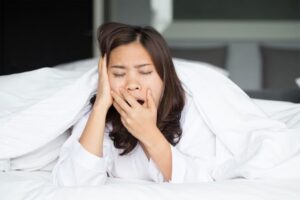Do you often find yourself waking up feeling exhausted, even after a seemingly adequate night’s sleep? Morning drowsiness can significantly impact your energy levels and overall productivity throughout the day. I’ll explore the various reasons behind waking up tired and share effective solutions to combat tiredness.
1. You Are Going to Bed at the Wrong Time, for YOU.
Remember you have a specific chronotype, and if you wake up at a time that is not consistent with your chronotype, it can make mornings miserable. For example, if you are a Wolf and you are waking up at 6 am, even if you gave yourself 8 hours to sleep, you will still feel terrible. This is because your brain still wants to produce melatonin, while you are trying to wake up!
Solution: If you want to learn about your chronotype, and when to go to bed, check out our free quiz.
2. You Stay in Bed too Long.
Many of my patients tell me that they hit the snooze 4-10 times while trying to get up in the am. This is a terrible idea and here is why: the average snooze button is about 7-9 minutes long, this does not give your brain the time it needs to get back into a deeper more refreshing stage of sleep. So, during the last 30-60 min of shuteye you are actually getting broken, fragmented sleep.
Solution: Set your alarm for the last minute until you need to get up. Or if you MUST have a snooze, then limit it to one time.
3. Your Bedroom Environment is Disturbing Your Sleep.
There are many different things that can be impacting your sleep in your bedroom. For one, your environment’s temperature is crucial to your sleep quality, so consider turning the A/C down or trying out a cooling mattress to help set the stage for restful sleep. To start, I look around the room based on the 5 senses and see what is being impacted. But if you want to do just one thing, I suggest limiting blue light exposure at night. Remember blue light will keep melatonin from being produced, which is critical for good rest.
Solution: Blue light blocking glasses, especially if you ever use a device at night, can help reduce light exposure and preserve your sleep-wake cycle. These should be on EVERY person’s bedside table!
4. Your Bedpartner is Keeping You From Getting Good Sleep.
Did you know that if you sleep next to a snoring bedpartner YOU lose an hour of sleep each night? Yes, it is true. But have you tried to get them to stop snoring and it failed? It’s likely because you’ve been trying incorrect solutions.
Solution: Check out my new Snoring Quiz to learn more about the type of snorer you have in your bed, and what solutions can be personalized for them, trust me you will be thankful that you did and most are very simple and inexpensive to use. And, if your bed mate is keeping you up not from an abundance of snoring, but rather from tossing and turning too much, consider trying out a memory foam mattress that limits motion so you can rest uninterrupted.
Shop the Best Mattresses of 20245. You Ate or Drank Something That is Reducing Your Sleep Quality.
The two biggest issues are alcohol and caffeine. While alcohol may make you feel sleepy, it actually keeps you out of the deep stages of sleep, which makes you feel awful in the morning. Caffeine does that same thing, this stimulant keeps your brain out of the deeper stages of sleep, which also makes sleep unrefreshing.
Solution: Stop caffeine by 2pm and stop alcohol 3 hours before bed. Caffeine has a half-life of 6-8 hours so stopping by 2 means that by at least half of it is out of your system by bedtime. As for alcohol, it takes on average an hour to metabolize 1 alcoholic beverage, so if you have several glasses with dinner, make sure it is out of your system before bed by waiting 3 hours.
6. You Could Have a Sleep Disorder.
While the symptoms may be mild, there are many sleep disorders that can affect sleep quality. A typical one is sleep apnea, but others include narcolepsy, insomnia, and restless legs syndrome.
Solution: It may be time to see a sleep specialist and do a sleep study. Check out this page on What Happens During a Sleep Study.
All of these and even more reasons are addressed in my Sleep Coaching Course “Get Better Sleep” which you can do all on your own for less than the cost of a bottle of “sleep” medication.
Ask the Sleep Doctor
Have questions about sleep? Submit them here! We use your questions to help us decide topics for articles, videos, and newsletters. We try to answer as many questions as possible. You can also send us an email. Please note, we cannot provide specific medical advice, and always recommend you contact your doctor for any medical matters.




